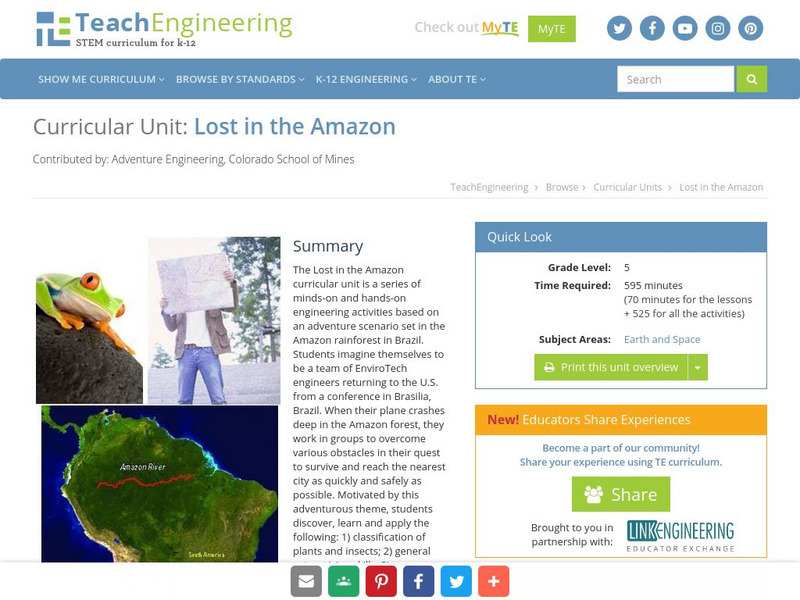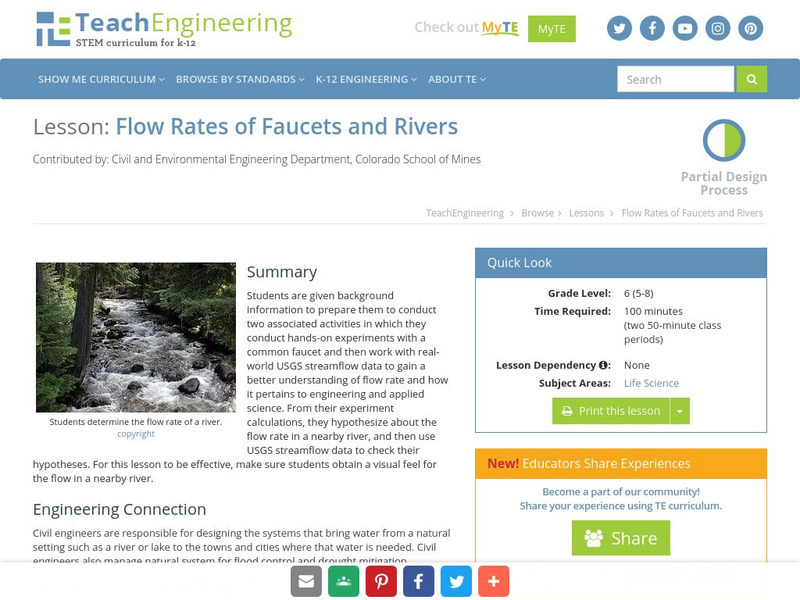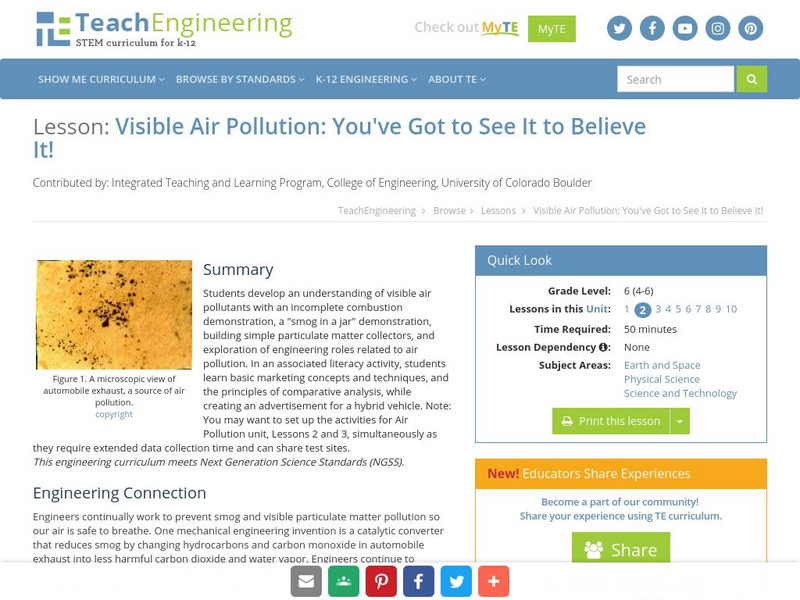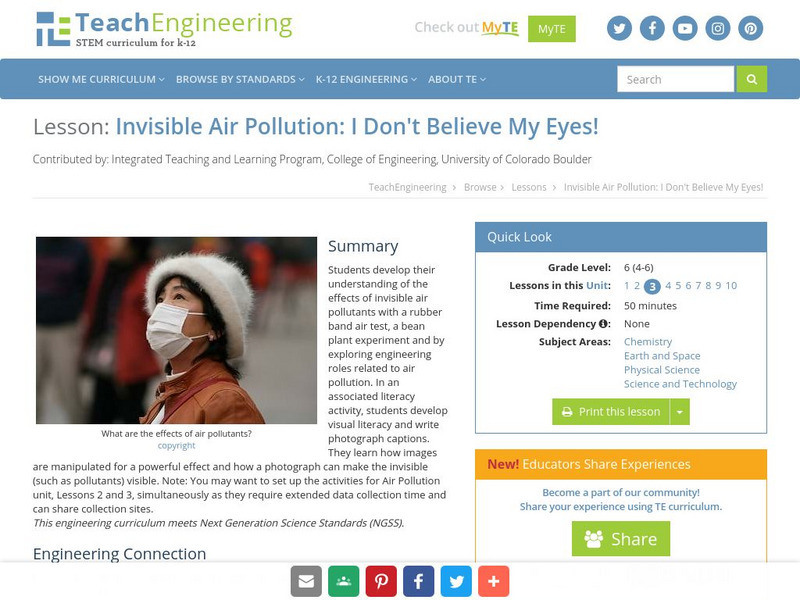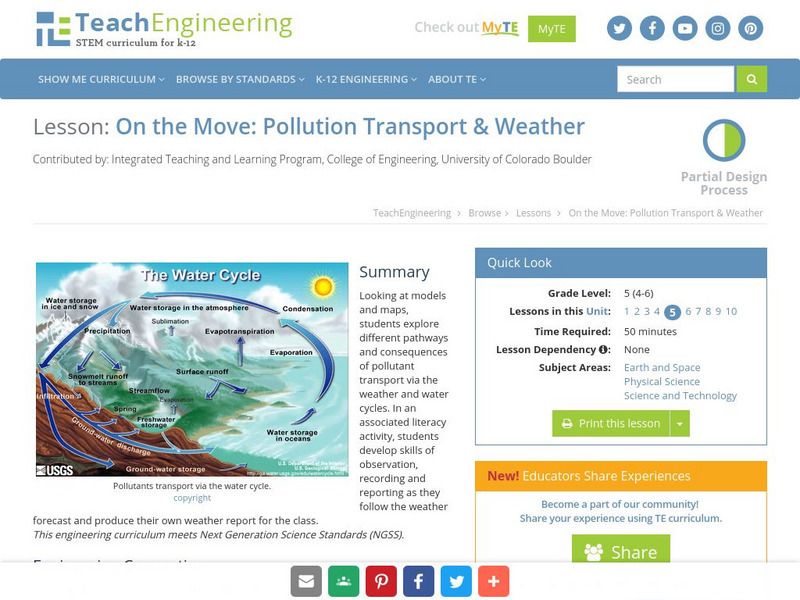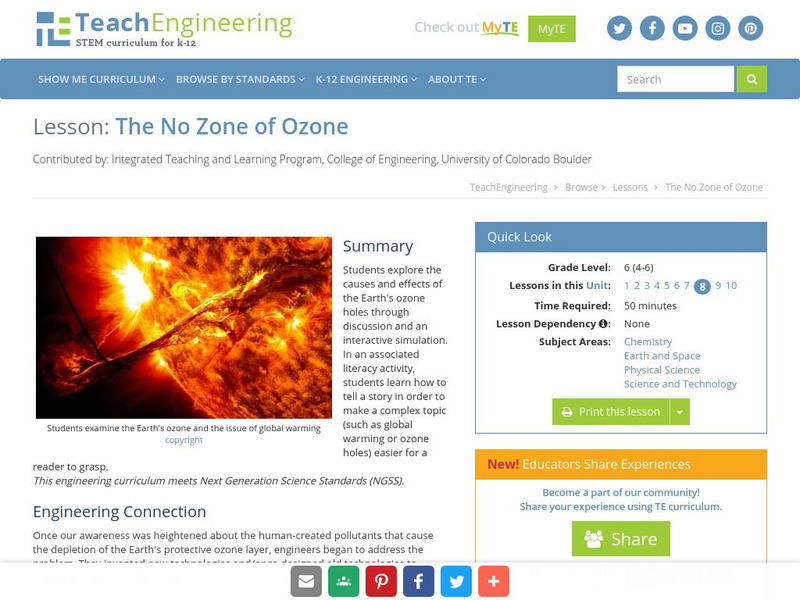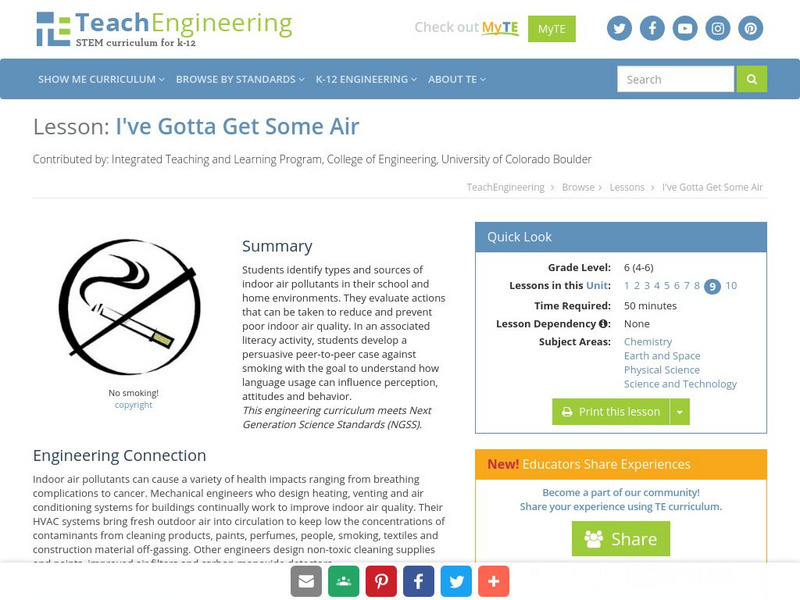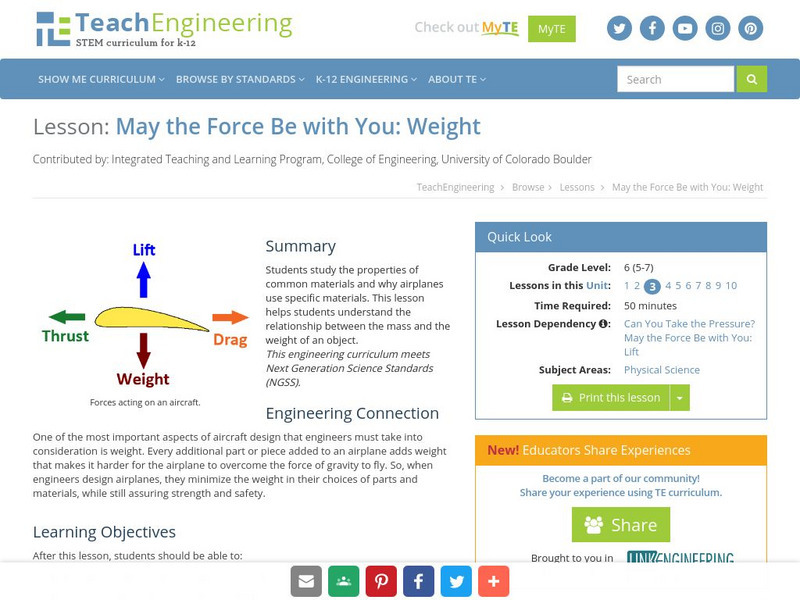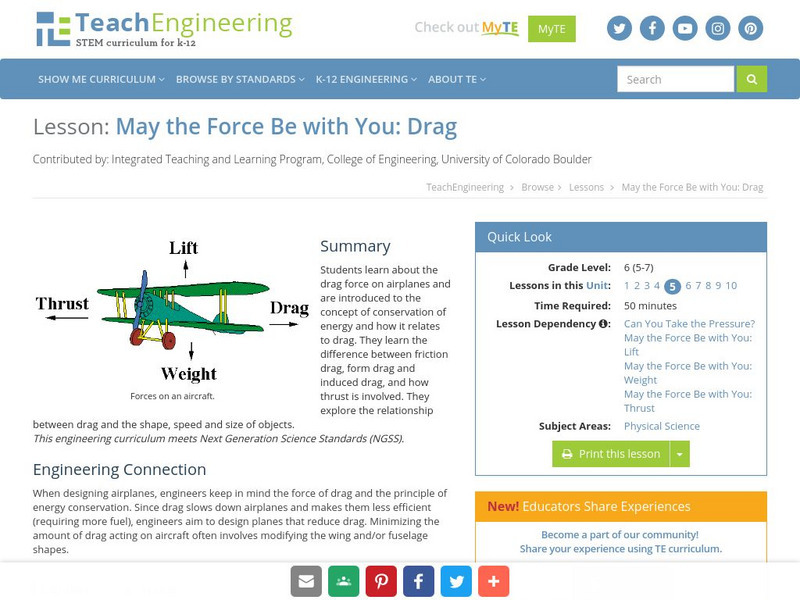Hi, what do you want to do?
TeachEngineering
Teach Engineering: Lost in the Amazon
The Lost in the Amazon curricular unit is a series of minds-on and hands-on engineering activities based in the Amazon rainforest in Brazil. Motivated by an adventurous theme, students discover, learn and apply a variety of skills....
TeachEngineering
Teach Engineering: Flow Rates of Faucets and Rivers
In the Flow Rate Experiment, students perform hands-on experiments with a common faucet, as well as work with the Engineering Our Water Living Lab (accessible through TeachEngineering.com) to gain a better understanding of flow rate and...
TeachEngineering
Teach Engineering: What's Air Got to Do With It?
Students are introduced to the concepts of air pollution and air quality. The three lesson plan parts focus on the prerequisites for understanding air pollution. First, students use M&Ms to create a pie graph that expresses their...
TeachEngineering
Teach Engineering: You've Got to See It to Believe It!
Students develop an understanding of visible air pollutants with an incomplete combustion demonstration, a "smog in a jar" demonstration, building simple particulate matter collectors, and exploration of engineering roles related to air...
TeachEngineering
Teach Engineering: I Don't Believe My Eyes!
Students develop their understanding of the effects of invisible air pollutants with a rubber band air test, a bean plant experiment and by exploring engineering roles related to air pollution. In an associated literacy activity,...
TeachEngineering
Teach Engineering: Weather Watchers
Students are introduced to some essential meteorology concepts so they more fully understand the impact of meteorological activity on air pollution control and prevention. First, they develop an understanding of the magnitude and...
TeachEngineering
Teach Engineering: On the Move
Looking at models and maps, students explore different pathways and consequences of pollutant transport via the weather and water cycles. In an associated literacy activity, students develop skills of observation, recording and reporting...
TeachEngineering
Teach Engineering: Not So Neutral Views
Students are introduced to acids and bases, and the environmental problem of acid rain. They explore ways to use indicators to distinguish between acids and bases. Students also conduct a simple experiment to model and discuss the...
TeachEngineering
Teach Engineering: Let's Heat Things Up!
Students observe demonstrations, and build and evaluate simple models to understand the greenhouse effect, the role of increased greenhouse gas concentration in global warming, and the implications of global warming theory for engineers,...
TeachEngineering
Teach Engineering: The No Zone of Ozone
Students explore the causes and effects of the Earth's ozone holes through discussion and an interactive simulation. In an associated literacy activity, students learn how to tell a story in order to make a complex topic (such as global...
TeachEngineering
Teach Engineering: I've Gotta Get Some Air
Students identify types and sources of indoor air pollutants in their school and home environments. They evaluate actions that can be taken to reduce and prevent poor indoor air quality. In an associated literacy activity, students...
TeachEngineering
Teach Engineering: Pollution Solutions
To develop an understanding of modern industrial technologies that clean up and prevent air pollution, students build and observe a variety of simple models of engineering pollutant recovery methods: scrubber, electrostatic precipitator,...
TeachEngineering
Teach Engineering: Can You Take the Pressure?
This lesson introduces learners to the concept of air pressure. Students will explore how air pressure creates force on an object. They will study the relationship between air pressure and the velocity of moving air.
TeachEngineering
Teach Engineering: May the Force Be With You: Lift
Students revisit Bernoulli's Principle (Lesson 1 of the Airplanes unit) and learn how engineers use this principle to design airplane wings. Airplane wings create lift by changing the pressure of the air around it. This is the first of...
TeachEngineering
Teach Engineering: May the Force Be With You: Weight
The purpose of this lesson is to help students understand the relationship between the mass and the weight of an object. Students will study the properties of common materials and why airplanes use specific materials.
TeachEngineering
Teach Engineering: May the Force Be With You: Thrust
In this lesson, students will study how propellers and jet turbines generate thrust. This lesson focuses on Isaac Newton's 3rd Law of Motion, which states that for every action there is an equal and opposite reaction.
TeachEngineering
Teach Engineering: May the Force Be With You: Drag
This lesson explores the drag force on airplanes. The students will be introduced to the concept of conservation of energy and how it relates to drag. Students will explore the relationship between drag and the shape, speed and size of...
TeachEngineering
Teach Engineering: Take Off With Paper Airplanes
This lesson introduces students to the art of designing an airplane through paper airplane constructions. The goal is that students will learn important aircraft design considerations and how engineers must iterate their designs to...
TeachEngineering
Teach Engineering: Are You in Control?
This lesson teaches the engineering method for testing wherein one variable is changed while the others are held constant. Students compare the performance of a single paper airplane design while changing the shape, size and position of...
TeachEngineering
Teach Engineering: Land! Water! Sky! Oh My!
This lesson focuses on the importance of airplanes in today's society. Airplanes of all shapes and sizes are used for hundreds of different reasons, including recreation, commercial business, public transportation, and delivery of goods,...
TeachEngineering
Teach Engineering: Will It Fly?
In this activity, students will learn about kites and gliders and how these models can help in understanding the concept of flight. Students will design and build their own balsa wood models and experiment with different control...
TeachEngineering
Teach Engineering: Art in Engineering Moving Art
Students learn how forces are used in the creation of art. They come to understand that it is not just bridge and airplane designers who are concerned about how forces interact with objects, but artists as well.
TeachEngineering
Teach Engineering: Environments and Ecosystems
Students explore the biosphere and its associated environments and ecosystems in the context of creating a model ecosystem, learning along the way about the animals and resources. Students investigate different types of ecosystems, learn...
TeachEngineering
Teach Engineering: A Mini World
As students learn about the creation of biodomes, they are introduced to the steps of the engineering design process, including guidelines for brainstorming. Students learn how engineers are involved in the design and construction of...





